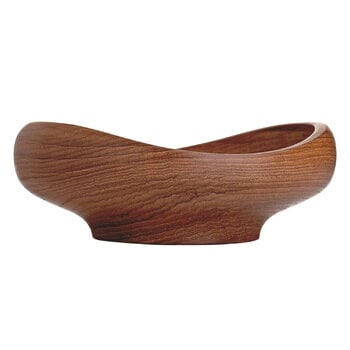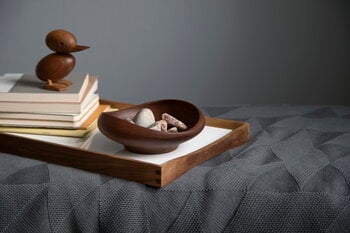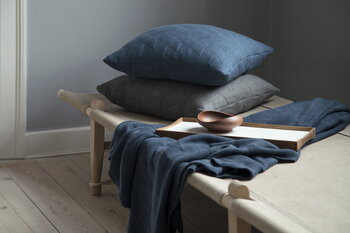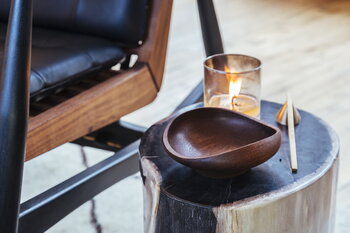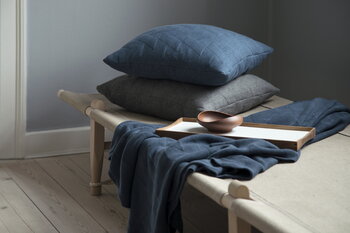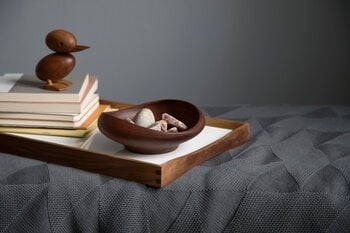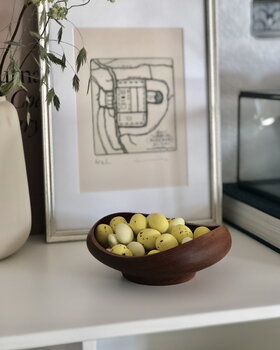The FJ Bowl from Architectmade charms you with its natural look created by the unique shape of the bowl and the teak wood used as the material. Designed by Danish design legend Finn Juhl in 1951, the wooden bowl represents Juhl's design esthetic in its purest form: organic shapes and dark wood combine with carefully thought out dimensions that make the bowl appear to change its shape depending on viewpoint. Made from a single piece of teak wood, the bowl will create a beautiful patina over time. The FJ Bowl is ideal for storing and diplaying jewelry and other small treasures.
FJ Bowl, teak
Architectmade
Description
The FJ Bowl from Architectmade charms you with its natural look created by the unique shape of the bowl and the teak wood used as the material. Designed by Danish design legend Finn Juhl in 1951, the wooden bowl represents Juhl's design esthetic in its purest form: organic shapes and dark wood combine with carefully thought out dimensions that make the bowl appear to change its shape depending on viewpoint. Made from a single piece of teak wood, the bowl will create a beautiful patina over time. The FJ Bowl is ideal for storing and diplaying jewelry and other small treasures.
Product details (4)
- Material
- Teak wood
- Colour
- Natural
- Height
- 1.97 in (5 cm)
- Diameter
- 5.91 in (15 cm)
- Product ID
Designer
Finn Juhl (1912-1989) was a Danish architect and industrial designer, and one of the most iconic designers of 20th century Danish design. Juhl studied architecture at the Architecture School of Royal Danish Academy of Fine Arts under Kay Fisker, a notable architect of his day, and after graduating he worked at the architect office of Vilhelm Lauritzen. In 1943 Juhl was awarded with Christian Frederik Hansen prize for young architects, and in 1945 he opened his own studio in Copenhagen.
As a designer Juhl balanced between strong, sculptural shapes and functional minimalism. His style was characterized by organic designs and the use of wood, especially dark woods such as teak. Juhl was also known as the designer who made the Danish Modern famous in America in the 1940s, and in the early 1950s he was chosen as the interior designer for the United Nations Trusteeship Council Chamber in New York City. During his career Juhl received many prestigious design and architectural awards, such as three gold medals at the 1957 Milan Triennale, and 1978 Honorary Royal Designer for Industry.
Would you like to read more about Finn Juhl and his work? Discover our books:
Watercolors by Finn Juhl
Reviews (1)
5
Based on 1 reviews
-
L
Lennart W
Jönköping, Sweden
Härlig dansk design, lätt och elegant!
209 days ago
Sustainability
The Product Sustainability Framework, our criteria of sustainable design, helps you find the most sustainable products in our selection. Read below which sustainability criteria this product has met.
Working conditions & labour 7/9
-
Equal opportunities for all employees
-
Commitment to UN Global Compact, fair compensation for all employees
-
Corporate responsibility requirements defined and communicated for suppliers
-
Systematic work for improved inclusion and well-being in the workplace
-
Transparent supply chain
-
Suppliers' compliance to a code of conduct ensured
-
Compliance to the UN Guiding Principles on Business and Human Rights ensured in the supply chain
-
Direct suppliers audited and certified
-
Support for community involvement in the supply chain
Eco-friendly production 9/9
-
Fair and resource-wise water-use in production
-
No incineration or landfilling of returned items
-
No use of endangered species as materials
-
No direct environmental emissions or waste (excl. GHGs) from production
-
The sustainability of direct suppliers' production is addressed and monitored
-
Production and material sourcing that respect biodiversity, animal rights, and natural ecosystems
-
Material-efficient and ecological packaging
-
Positive impact on nature’s well-being through operations that regenerate natural ecosystems
-
No potentially harmful chemicals used in own production
Climate impact 5/8
-
Company's direct greenhouse gas emissions identified and commitment to reduction
-
Product's carbon impact identified and commitment to reduction
-
Guidance on energy- and eco-efficient use of the product
-
Contribution to climate initiatives beyond the brand’s direct operations
-
Low-carbon or compensated transportation
-
Carbon footprint of the product calculated and goals set to reduce it
-
100 % renewable energy in own production and operations
-
Carbon neutral or carbon negative product
Sustainable materials 6/6
-
Sustainable and long-lasting material choices
-
No harmful or hazardous substances
-
Responsible raw material sourcing and production
-
Materials suited for circularity: monomaterials, recyclable finishings, renewable or recycled contents etc.
-
Ecological materials: natural, biodegradable, recyclable or recycled contents
-
Outstanding materials in terms of innovativeness, responsibility, sustainability and circularity: local production or sourcing, 100 % recycled content, C2C-certification etc.
Circular design 5/5
-
High aesthetic quality promoting long-term use of the product
-
Technically durable product design and material choices
-
Design for enduring life-long quality
-
Design and support for product maintenance, repair and upgradability
-
Innovative circular design solutions: circular service system, resale platform, remanufacturing, collection of used products, etc.
